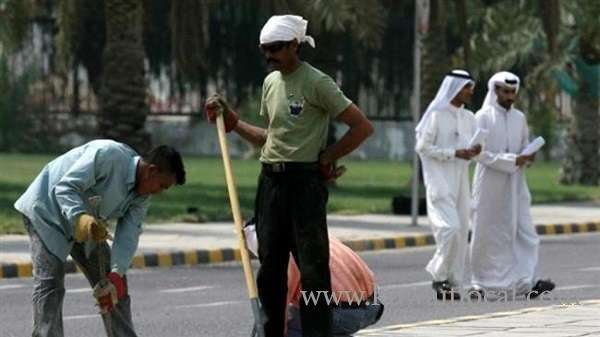Latest News
- From Tomorrow, Traffic Diversion On Third Ring Road
- Ministry Of Health Refute Rumors On Non-availability Of Antibiot...
- Amir Of Kuwait And Jordan King Renew Commitment To Regional Secu...
- 37 Arrested With Narcotics And Firearms
- Outrage Over Candidate's Arrest
- Six Stores Shut Down In Jahra For Selling Fake Goods
- Peddlers Caught With Drug Pills And Crystal Meth
- PAFN Shuts Down Restaurants And Bakeries Over Violations
- MoI Officer And Lawyer Jailed On Fraud Charges For Bad Cheques
- Thousands Of Bangladeshis Gathered To Pray For Rain
- Kuwait University Symposium Addresses Student Counselors' Role I...
- Kuwait Affirms The Importance Of Group Work In Addressing Common...
Blaming Expats For Everything Is Not A Solution To Problems

Concurring with the view recently expressed by several local and regional media outlets, we believe that blaming foreigners for all the shortcomings in Kuwait is a refrain that has run its course. It is time for the country to do an honest introspection, in order to identify and rectify the real reasons why Kuwait continues to underperform, at least in relation to other Gulf Cooperation Council (GCC) states.
In recent years, social media and other media have been rife with complaints against expatriate workers, blaming them for everything from crowding at hospitals to traffic congestions. Lately, politicians, in an attempt to grab media attention and placate their electoral base, have joined the expatriate bashing spree, coming out with outlandish accusations against foreigners. While one politician compared expatriates to colonists and squatters, another said that foreigners were competing with citizens in every field, “even for the air we breathe.”
“Isn’t time for us to put an end to this?” asked Safaa Al Hashem, a parliamentarian in the current National Assembly. “We must reform the current system. We must impose taxes on expatriates, not on Kuwaitis,” she added. Some politicians have called on the government to deport 100,000 expats annually to balance the country’s demographics. After Al Hashem’s “air we breathe” comment, fellow lawmaker Abdul Karim Al Kandari called for a special session of parliament to discuss what he called the “alarming increase in the number of expats versus Kuwaiti nationals. We refuse to be a minority in our own country,” he said.
These tirades against expatriates were not the first made by parliamentarians, nor is it likely to be the last. Expatriates currently account for nearly 70 percent of the 4.4 million people in Kuwait and are an easy scapegoat for many of the economic hardships felt by citizens on the back of the government’s falling oil revenues.
Recently the government responded to citizens’ criticism of overcrowding at local hospitals by reserving morning hours only for citizens and limiting expatriate hospital visits to evening hours, except in case of emergencies. The new Jaber Al-Ahmad Hospital, the country’s first public hospital to open in more than three decades, is slated to open shortly. But, when the nearly one billion dollar health facility eventually opens its doors, it will only be open to citizens. That move had manifested a lot of criticism in local and international media.
So it is no surprise that the government’s latest move to restrict access to its newest hospital only to citizens has evoked widespread criticism. “They were granted their workers’ visa. They deserve to be treated with dignity,” Dr. Yousuf Al Muhanna, a 34-year-old general surgeon, said of the migrant workers. The discrimination goes against the Hippocratic Oath, he says. “We are not supposed to look at their passports — we are supposed to deal with their medical conditions.”
Kuwait, like other Gulf states, has for decades offered a free cradle-to-grave health care for its citizens, along with plenty of generous perks such as subsidized utility prices and housing grants. But the low oil price scenario in recent years, which led to shortfall in revenues and budget deficits across the GCC has meant that many governments have introduced a spate of economic reforms, including trimming the wide-ranging subsidies offered to citizens. This has aggravated feelings against foreigners among many citizens who believe that expatriates are somehow responsible for all their miseries and that they are expropriating available resources and opportunities.
We have heard this argument before; of blaming specific communities or groups for the assumed hardships of citizens. Most recently we heard it when migrants began flooding across European mainland;, but there was an even more catastrophic precedent in Europe, that happened in the 1930s and we all know how that ended
Trending News
-
 Kuwait Implements Home Biometrics Services Ahead O...
14 April 2024
Kuwait Implements Home Biometrics Services Ahead O...
14 April 2024 -
 Kuwait Airways Provides Update On Flight Schedule...
14 April 2024
Kuwait Airways Provides Update On Flight Schedule...
14 April 2024 -
 Kuwait Airways Introduces Convenient Home Luggage...
15 April 2024
Kuwait Airways Introduces Convenient Home Luggage...
15 April 2024 -
 Expat Residency Law Amended By Kuwait Ministerial...
20 April 2024
Expat Residency Law Amended By Kuwait Ministerial...
20 April 2024 -
 Gathering For Eid Al-Fitr Prayers: Kuwaiti Citizen...
10 April 2024
Gathering For Eid Al-Fitr Prayers: Kuwaiti Citizen...
10 April 2024 -
 Two Expats Are Arrested For Stealing From Salmiya...
17 April 2024
Two Expats Are Arrested For Stealing From Salmiya...
17 April 2024 -
 An Egyptian Expat Dies At Kuwait's Airport
11 April 2024
An Egyptian Expat Dies At Kuwait's Airport
11 April 2024 -
 Kuwait Airways Resumes Flights To Beirut And Oman...
15 April 2024
Kuwait Airways Resumes Flights To Beirut And Oman...
15 April 2024 -
 Bay Zero Water Park Kuwait: Summer Season Opens Ei...
11 April 2024
Bay Zero Water Park Kuwait: Summer Season Opens Ei...
11 April 2024 -
 Temperature Increases Cause Electricity Load Index...
21 April 2024
Temperature Increases Cause Electricity Load Index...
21 April 2024












Comments Post Comment